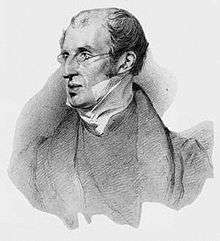Hugh James Rose
| The Reverend Hugh James Rose | |
|---|---|
 | |
| Born |
9 June 1795 Little Horsted, England |
| Died |
22 December 1838 (aged 43) Florence, Italy |
| Nationality | English |
| Office | Principal of King's College, London (1836–1838) |
| Spouse(s) |
Anne Cuyler (m. 1819) |
| Parent(s) |
|
| Relatives | Henry Rose (brother)[2] |
| Ecclesiastical career | |
| Religion | Christianity (Anglican) |
| Church | Church of England |
| Ordained |
|
| Academic background | |
| Alma mater | Trinity College, Cambridge |
| Influences | William Wordsworth[1] |
| Academic work | |
| Discipline | Theology |
| School or tradition | High-church Anglicanism[2] |
| Institutions | |
| Influenced | George Hills[3] |
Hugh James Rose (1795–1838) was an English Anglican priest and theologian who served as the second Principal of King's College, London.
Life
Rose was born at Little Horsted in Sussex on 9 June 1795 and educated at Uckfield School, where his father was Master, and at Trinity College, Cambridge, where he was conferred the degree of Bachelor of Arts in 1817, but missed a fellowship.[4] He was then President of the Cambridge Union Society for the Michaelmas term of 1817.[5] Having been ordained to the diaconate in 1918, he was appointed to a cure in Buxted, Sussex, in 1819.[6] He married Anne Cuyler and was priested later that year.[1] In 1921, he was appointed to the vicarage of Horsham, Sussex.[6]
After travelling in Germany, Rose delivered as select preacher at Cambridge, four addresses against rationalism.[4] In 1827 he was collated to the prebend of Middleton, which he held until 1933.[7] In 1830 he accepted the rectory of Hadleigh, Suffolk, and in 1833 that of Fairsted, Essex, and in 1835 the perpetual curacy of St Thomas's, Southwark.[4] Rose was a high churchman, who to propagate his views in 1832 founded the British Magazine and so came into touch with the leaders of the Oxford Movement.[4] Out of a conference at his rectory in Hadleigh came the Association of Friends of the Church, formed by Hurrell Froude and William Palmer.[4]
In 1833–1834 Rose was professor of divinity at the University of Durham, a post which ill-health forced him to resign.[4] He was appointed Principal of King's College, London, in October 1836, but was attacked by influenza, and after two years of ill-health he died in Florence, Italy, on 22 December 1838.[4] He is buried in the English Cemetery, Florence, his name in the register given as "Ugo Giacomo Rose", his Scipio tomb having a lengthy epitaph in Latin.
Works
Rose published in 1825 as The State of the Protestant Religion in Germany. The book was severely criticized in Germany, and in England by Edward Pusey. In 1836 he became editor of the Encyclopædia Metropolitana, and he projected the New General Biographical Dictionary,[8] a scheme carried through by his brother Henry John Rose (1800–1873).
References
Footnotes
Bibliography
- Chisholm, Hugh, ed. (1911). "Rose, Hugh James". The Encyclopædia Britannica. 23 (11th ed.). New York: Encyclopædia Britannica. p. 729.
This article incorporates text from this public-domain publication. - Friesen, Jean (1990). "Hills, George". Dictionary of Canadian Biography. 12. Toronto: University of Toronto and Université Laval. Retrieved 12 October 2018.
- Nockles, Peter B. (2014) [2004]. "Rose, Hugh James (1795–1838)". Oxford Dictionary of National Biography (online ed.). Oxford: Oxford University Press. doi:10.1093/ref:odnb/24094.
- Rigg, J. M. (1897). "Rose, Hugh James". In Lee, Sidney. Dictionary of National Biography. 49. London: Smith, Elder, & Co. pp. 240–242.
- Rose, Hugh James (1857). A New General Biographical Dictionary. 12. London: T. Fellowes. Retrieved 12 October 2018.
Further reading
- Burgon, John William (1891). Lives of Twelve Good Men.
External links
| Wikisource has original works written by or about: Hugh James Rose |
| Academic offices | ||
|---|---|---|
| Preceded by William Otter |
Principal of King's College, London 1836–1838 |
Succeeded by John Lonsdale |